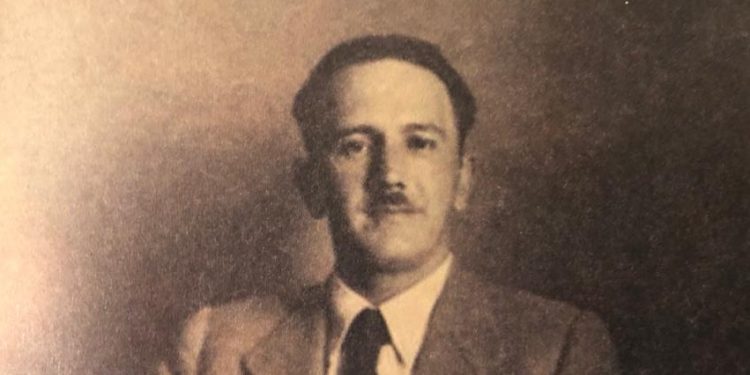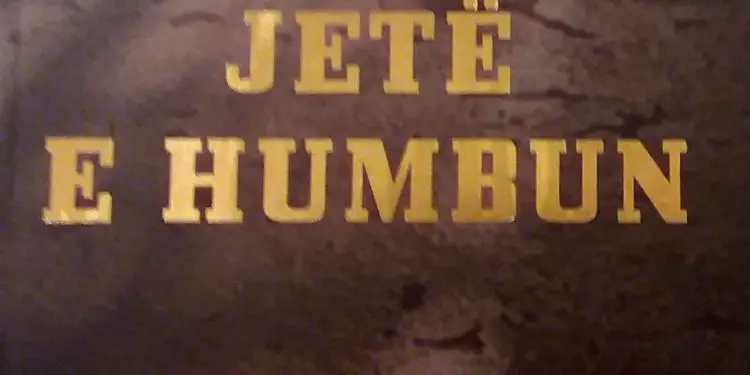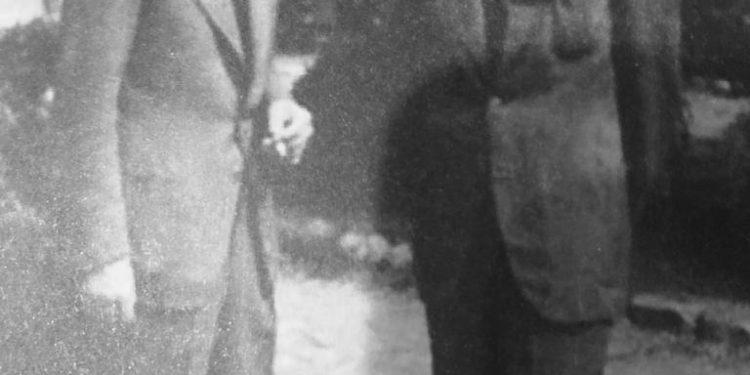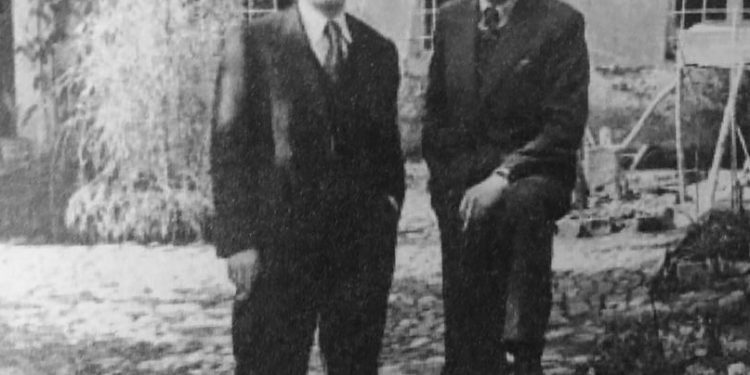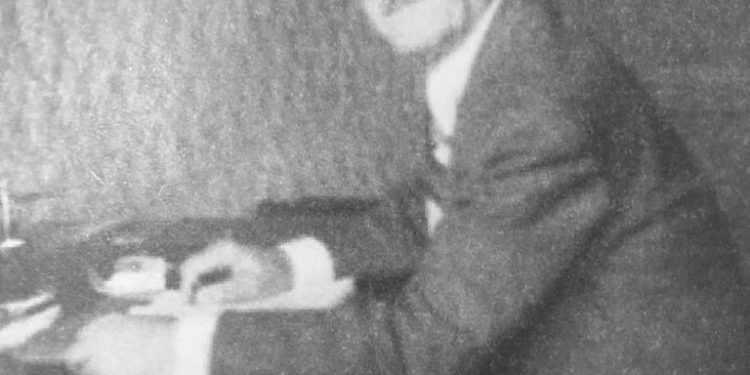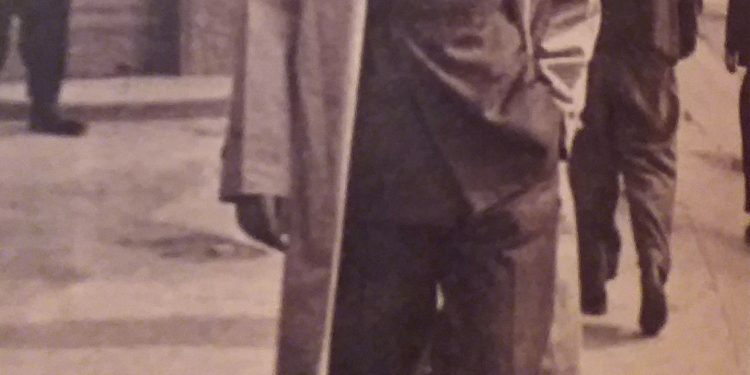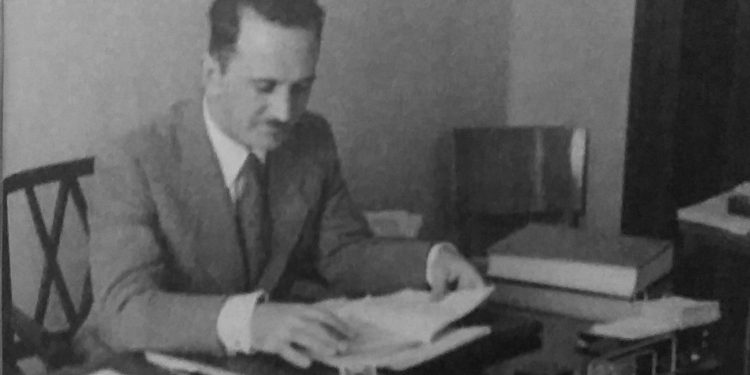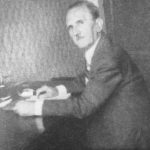
Ejëll Çoba
Part nine
Memorie.al publishes some parts from the memoir of the author Ejëll Çoba, the well-known intellectual from the city of Shkodra, the sucker of one of the most famous families of that city, who after graduating from the University ‘La Sapienza’ of Rome in In 1932, he returned to his homeland where he practiced his profession, pursuing an administrative career, as ‘Dottore in Giurisprudenca’ and then for several years in the senior state administration, where he also occupied the period of occupation of the country, (1939- 1944), where he held several senior positions, as Director in the Ministry of Justice, Secretary General of the Council of Ministers, Deputy Minister of Internal Affairs, etc. His arrest in 1946, (together with his brother, Kelin) accused of participating in the ‘Postriba Movement’ and after a long investigation in Shkodra and Tirana, was sentenced to 25 years in prison, of which he suffered a full 23 years and five months, and five days in prison, in the terrible camps of forced labor, all the way to Burrell Hell. The unknown memories of Ejell Çoba, which come with an introduction by his fellow citizen, the famous writer, Zija Çela, present to the reader a panorama ‘painted with the brush’ of pain, where details and details are given about his sufferings in the camps. of the prisons of the communist regime of Enver Hoxha, as well as other accomplices, known and unknown names, such as: Father Bernardin Palaj, Guljelm Suma, Syrri Anamali, Ramdan Sokoli, Cin Serreqi, Father Karol Serreqi, Father Filip Mazrreku, Hamdi Isufi, Hafiz Ali Kraja, Beqir Çela, Musa Gjylbegu, Asim Abdurahmani, Prof. Selman Riza, Petrit Merlika, Kolec Deda, Nikoll Deda, Felatun Vila, Gjush Deda, Sali Vuçiterni, Emin Bakalli, Qani Katroshi, Sali Doda, etc., as well as some names of investigators, guards, State Security officers, such as Fadil Kapisyzi , etc.
Continued from the previous issue
C A M P I
Memoirs written from early 1978 to…
That night, when I fell asleep, I started eating some fake bread, but my hunger was so great that I ate both of them before I fell asleep. The next day, which was Sunday, I thought I would be satisfied once and for all with the bread we bought, and with the ration they gave us in the morning, and I lay down with a box of goose. I ate it all, but in vain, because on the days of rest the hunger was felt even more. That same day I was forced to buy a quarter of a loaf of bread for lunch and a quarter for dinner. Who has not tasted hunger, cannot believe how 2.25 kg can be eaten. bread in a day and having hunger again.
That Sunday gave us another surprise, Before the drake we were all taken out of the silos, then the squad-commanders were introduced, who were generally ordinary prisoners, and under the direction of the guards they took every food they found: butter, oil, sugar, pasta, rice, flour etc. They had only taken the box of geese that they found in my suitcase, then the other five, I had in the strike that I always carried with me. Even when I went to the bathroom, I hung it on the crossbar of the door frame. We were told that with the food taken, a special cauldron would be cooked, for those who had met the norm during the week.
In fact, before dinner they divided it into two groups: some 1000 people, those who had met the norm, lined up in front of the special bins, while the others, some 500 people, lined up in front of the special bins, while the others, some 500 people, money kettles with tomato juice. Surprisingly, my normist had added me to the list of those to be taken to the special cauldron. He was an ordinary prisoner from the villages of Korça, who, whenever he realized that measures would be taken against those who did not meet the norm, would issue me the norm to be met.
They lined us up for four and told us to sit on the ground. I, the skepitk, had taken my place by the end of the row. Before me I had Rrok Gera, Musa Gjylbegu and Rrok Kola, all three former ministers. The four of us thought that we would not be allowed to eat in the special cauldron, we kept the opportunity to leave us without being noticed. We saw the guards with the squadron-commanders coming out of the ranks of ballista, zogista, gendarmes, kulaks, bourgeois, tsarists, etc.… When we saw that the number of expelled people was increasing, we got up and left before the cleansing”. Then I heard the craft of team-commanders saying: “Ministers, ministers”!
At dusk, after dinner, I often went out to cool off and hang out with Gaspër Palin, Pjetër Haxhinë, Musa Gjylbegu, Zef Nikë and someone else, and there in the semi-darkness we talked and encouraged each other. Gjon Gjini, a gendarmerie captain, often came. Once, when he was looking to find us in the middle of the piles of collapsed and could not see, he started shouting:
- Zef Nika, Zef Nika!
- Who is the one looking for me? – Zefi said and when John approached, he said: – Why do you call my name?!
I’m angry at my name and no one wants to know me! Zefi was quite right that only squad-commanders shouted loudly at the prisoner who would appear before the guards, certainly not for good.
The most horrible thing was when the wolf of some squad-commander woke up at night and, as he walked along the hut, called out the name of some danger that had to appear in the guard office. Everyone raised their ears from the veils and understood the name of the friend who was called, let us think again: “Thank God, this is not my name”.
The night in the silo was a real hell. In sleep people scream from the aching body pain: “Ah, uh!”. Many people were anxious about work, norms, so even in their sleep they shouted: “Shovel, pickaxe, cart, canal…”. Gjon Rakacolli often repeated: “He coded Danti, if he had come here to describe hell…”!
At the end of the summer, a small group of prisoners came from Durrës prison. The next day one of them said to me: “You work not only by day, but also by night!”
He was absolutely right, even in sleep we were tormented by the zeal of work. Work indeed ennobles man, but behold that of the slave! We had passed many slaves to the pyramids! I do not know how far it is to believe them, but a prisoner who had been in a ‘Nazi camp’ told us that people were not tortured there either, as in Vloçisht!
A young boy from Shkodra, Virtyt Gjylbegu, had come to the camp with the prisoners of Elbasan. He was the son of Hamid Gjylbeg, a writer, a kind of philosopher, about whom Fulvio Cordignano had written that in his works, there was a new religion. His very long life full of suffering showed a man of strong character. One day, when Virtue had not gone to work after being on a doctor’s report, it happened to me two or three times to work near Virtue, because even he like me was not allowed to work with friends so as not to use the efforts of others. I tried to give him courage, because I saw him very depressed, even though he spoke little and closed the conversation by saying:
- Ah, take Mr. Çoba, I cannot…!
- I who am 40 years old – I told him – I am trying to cope, not you who are 28 years old! But I saw that my words were not enough, that he repeated: “They do not tolerate, they do not tolerate”!
He did not sleep much overnight, we heard gunshots. The next day I learned that Virtue, after returning from work, had left, cleaned and put on the best clothes he had.
A guard, who had seen him well dressed, with a mocking tone, had told him:
- Virtyi, will you not be freed that you are dressed as a son-in-law?
- Yes, I will be released – he had answered verbally.
As soon as the camp had fallen asleep, Virtue, so clothed, came out of the hut and approached the camp wires illuminated by numerous lamps. The guard had called out to him two or three times: “Stop, stop!”, But Virtue did not stop and continued to approach the wires. They said to the guard: “Shoot!”.
The guard had carried out the order taken by Virtue and had fallen dead instantly.
In the morning, among the 1,500 people who went to work, no one spoke!
The work was very heavy. Fatigue forced the prisoner to find any means and a reason to rest for a minute. Many people, as a cause of defecation, would go after a bush and there, gall, light a cigarette or rest. Thus, a boy from Dibra, from the Ndreu tribe, was fired three or four times one day. The guard had noticed him and the last time he had called him and asked him:
- Where were you?
- In need – was the answer.
- Let’s go to where you were.
Dibrani, a boy almost two meters tall, had cut them. Of course, they had found nothing but a snail. The guard had forced the prisoner to take him by the hand and so with open slaps he had brought him to the brigade to tell his comrades and they were told: “Look what I did!”
Also, in the camp was Zafer Vila, the son of Xhafer Vila, who had died on the plane that crashed in Italy on the return trip after Zog’s marriage. Zaferi was an intelligent and cultured boy. He had been a functionary in the Ministry of Foreign Affairs. He was optimistic, a quality that few of us continued to maintain in those conditions. He was young, healthy and coped with work, without giving up like most. The word was fluent, warm and often persuasive.
On the Sundays before dinner, we would go outside the barracks to get some fresh air. When it happened to me to meet Zafer, we walked a little together and tried, based only on the news we read in the newspaper, to explain Albanian and international politics. Even after breaking up with Tito, I did not find enough elements to formulate a comforting thought about our future and that of Albania.
Zaferi, on the other hand, made some excuses that, based on some premises, ended in an optimistic result. I generally liked to listen to the thoughts and reasoning of others, to listen to the thoughts and reasoning of others to confront my own, and then to choose. Although Zafer’s reasoning did not convince me, I liked to listen to it, I felt some spiritual relief, and to say a refreshment.
Scarce water, fatigue, lack of underwear, hunger, all together had such an atmosphere that people did not care so much about personal cleanliness, and when the autumn of the prisoner began to wear sweaters and coats, lice appeared.
One night the screams woke me up. I looked up and saw that on the first floor opposite me, two people sleeping next to each other, trying to take a bag from a third, who dropped it and ran away. I learned that he was a prisoner, coming from another cell, and that he had easily untied the bag of bread hanging on his head to steal his bread.
The famine was so severe in the camp that it added to the young men ‘s courage to push themselves to steal. And what to steal from me?! The friend’s bread, which he had no more than the camp gave as a ration to the thieves themselves!
For all the indescribable misery of camp life, there were moments of humor.
One morning, as soon as I got my tea in the kettle and was heading to the brigade to be ready to go to work, I saw two people sitting. They were Alfred Ashiku and Gjergj Ashta. They called me and said:
- Do you choose for us, is it better to eat your bread accompanied by a date with tea, or to soften the bread in the tea?
- The problem is difficult, so I will give you the answer when I get back from work – I continued on my way.
And a friend of my friend, Pashko Gjeçi, a professor of literature and an excellent translator of the “Divine Comedy”, because of his very small body was not included in the working groups, but was charged with occasional auxiliary work. He met me once and saw me carrying a 4-meter-long lagoon slab on my back. Only the legs of the desolate professor could be seen!
When we got back from work, in the pile, we got together. I asked: – How did you spend the day?
He always answered me – Good.
So, he answered that night I had seen him with a plank in his arm. We immediately started a literary or art conversation. I was glad to hear that it was passing me by in an unreal life. The conversation with him was for me an elixir, which took away all my fatigue. /Memorie.al




